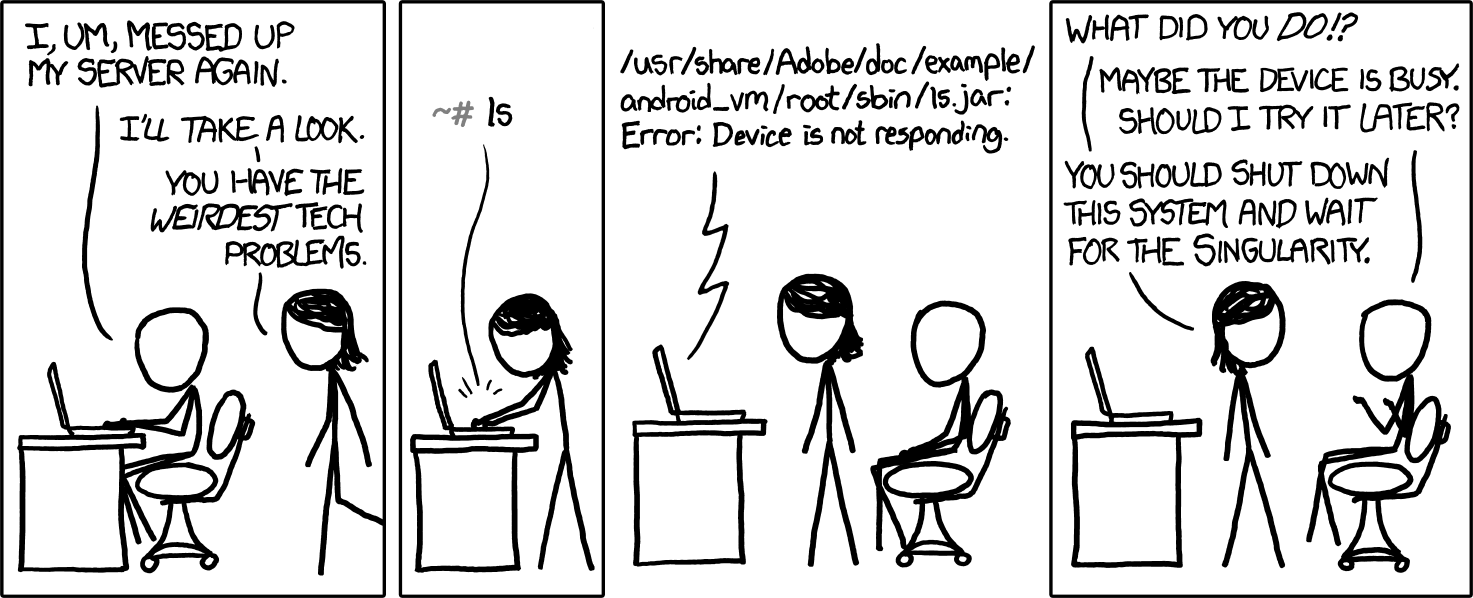

Yeah. Valve invented most of the attention direction techniques for Half-life (light, motion, etc, etc.) Trailblazers.
When I get bored with the conversation/tired of arguing I will simply tersely agree with you and then stop responding. I’m too old for this stuff.


Yeah. Valve invented most of the attention direction techniques for Half-life (light, motion, etc, etc.) Trailblazers.


“Let’s give them lots of player freedom this time!”
Play testers continually don’t look at a set piece vista the developers and artists spent 400 hours creating.
“Well, that’s enough of that. Back to the rails.”


“Your honor, rather than pay his outstanding debts, this shiftless f***wit used 75 million dollars to fund a SuperPAC to bother people at their homes for the benefit of the Trump campaign.”


Not the original, but…





Edit: Sorry! I misread your comment at first. Yeah, now that you say that, that makes the most sense.
But from the standpoint of anti-competitivity and Android vs iOS with Apple…
One’s behavior is denying access to their app store without agreeing to a set of device restrictions, but everything on the app store is available without the app store at developer discretion.
The other is an app store which MUST be installed, and is in fact the ONLY way to get software for the device.
One is CLEARLY more anti-competitive than the other, and yet the one that’s LESS problematic is the one that gets court action. It’s a joke.


https://source.android.com/license
https://en.wikipedia.org/wiki/Android_(operating_system)
“At its core, the operating system is known as the Android Open Source Project (AOSP)[5] and is free and open-source software (FOSS) primarily licensed under the Apache License. However, most devices run on the proprietary Android version developed by Google, which ships with additional proprietary closed-source software pre-installed,[6] most notably Google Mobile Services (GMS),[7] which includes core apps such as Google Chrome, the digital distribution platform Google Play, and the associated Google Play Services development platform. Firebase Cloud Messaging is used for push notifications. While AOSP is free, the “Android” name and logo are trademarks of Google, which imposes standards to restrict the use of Android branding by “uncertified” devices outside their ecosystem.[8][9]”
Android itself DOES NOT require ANY concessions of ANY kind to Google.
Android itself DOES NOT require ANY concessions of ANY kind to Google. Maybe “opening the app store” means making Google’s services available without requiring those concessions to Google, in which case, that both makes sense and is a great idea.


This is the clearest and most sensible explanation of the situation, but I’m still not sure what’s meant by “opening the app store”. The reality is apps can be sideloaded and distributed freely on Android, even unrooted. Sure, Google requires OEMs to push Google services and tracking, and that’s evil and horrible and nasty, but do they actually force that onto app developers as well?


That’s not actually true though.
Android is open source and many devices, mostly Chinese products, launch with custom Android builds completely free of Google services. This is not a Google constraint - manufacturers CHOOSE to use Android builds that use Google’s services. Creating your own build simply stops you from integrating Google’s services into the OS, which is actually a PLUS if you ask me.
Even if they WERE requiring it, that would have nothing to do with end user store front installation, which is already something you can do, as shown by the 2 non-Google app stores I have installed on my phone.
Again… I’m not defending Google as some kind of good company here. I’m simply stating there is no way to make an anti-competitivity argument against Google in mobile that doesn’t apply at least as much to Apple. This is a nonsensical double-standard.


I appreciate you guys fighting the good fight.
At least SOMEONE’S on it.


I wouldn’t say Google has been “beaten into submission”. They still interweave their crap services into every Android phone with no ability to remove or disable them, couple their apps with an intrusive, privacy violating, system degrading backend with special rules for its own apps versus everybody else… even force the default system web browser to be an unremovable Chrome installation, and not even a peep from regulators that any of this might be anti-competitive.
No company has been properly beaten into submission since Ma Bell. Even the big Microsoft browser decision in the 90s turned out to be a joke - they’re right back to doing the same thing with impunity.


Apple was first. And the courts ruled it no problem.


I hate Google as much as anybody else, but that Google has been ordered to open up when they already allow side loading, and Apple is apparently all good, is all you need to know this whole system is a joke.

Obligatory XKCD


Make no mistake… those people are clowns too.
Yes! Containerize, containerize, containerize until every perfectly good machine built before 2020 is rotting away in a landfill!


I mean, it would make sense.
The only way a conspiracy theorist can be swayed is if being right isn’t a win condition. If there’s no other person to feel better than when you’re debating, something might actually sink in.


In the sense that it’s a matter of being in the right place at the right time, yes. Exactly the same thing. Opportunities aren’t equal - they disproportionately effect those who happen to be positioned to take advantage of them. If I’m giving away a free car right now to whoever comes by, and you’re not nearby, you’re shit out of luck. If AI didn’t HAPPEN to use massively multi-threaded computing, Nvidia would still be artificial scarcity-ing themselves to price gouging CoD players. The fact you don’t see it for whatever reason doesn’t make it wrong. NOBODY at Nvidia was there 5 years ago saying “Man, when this new technology hits we’re going to be rolling in it.” They stumbled into it by luck. They don’t get credit for forseeing some future use case. They got lucky. That luck got them first mover advantage. Intel had that too. Look how well it’s doing for them. Nvidia’s position over AMD in this space can be due to any number of factors… production capacity, driver flexibility, faster functioning on a particular vector operation, power efficiency… hell, even the relationship between the CEO of THEIR company and OpenAI. Maybe they just had their salespeople call first. Their market dominance likely has absolutely NOTHING to do with their GPU’s having better graphics performance, and to the extent they are, it’s by chance - they did NOT predict generative AI, and their graphics cards just HAPPEN to be better situated for SOME reason.


Go ahead and design a better pickaxe than them, we’ll wait…
Same argument:
“He didn’t earn his wealth. He just won the lottery.”
“If it’s so easy, YOU go ahead and win the lottery then.”
But first he will accidentally the whole thing.